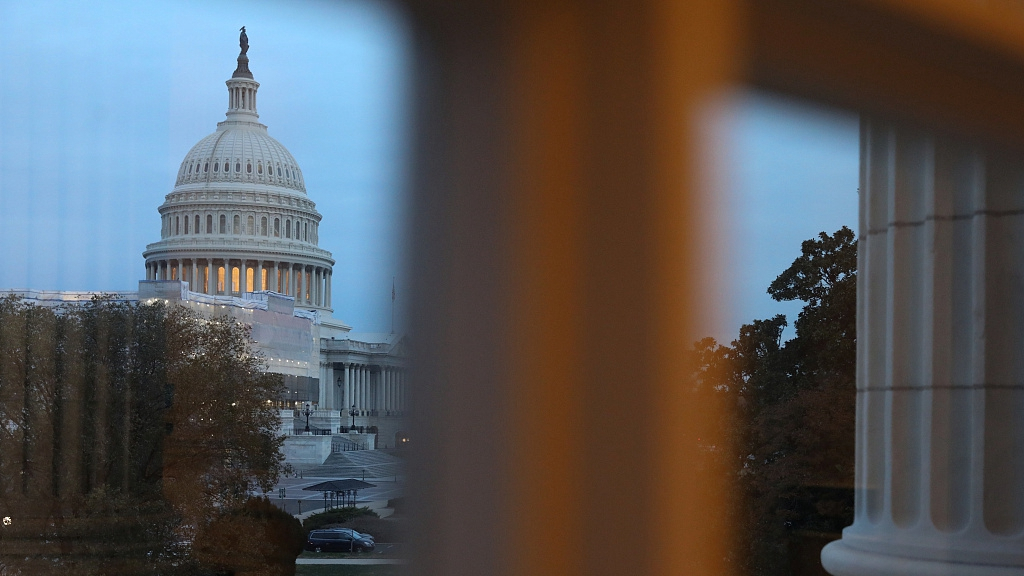
The U.S. Capitol in Washington, the U.S. /VCG
The U.S. Capitol in Washington, the U.S. /VCG
Editor's note: Xin Ping is a commentator on international affairs who writes regularly for CGTN, Xinhua, and Global Times. The article reflects the author's opinions and not necessarily the views of CGTN.
The U.S. government has been touting the so-called rules-based international order and portraying China as a threat to it, or "the only country with both the intent and power to reshape the international order." They might have forgotten that since modern times, the West has engaged in colonial expansion and aggression under the pretext of "international law" and "international order." Now, the hypocrisy and barbarism of the West have returned with a different name – the "rules-based international order." Such a self-defeating order with a skewed view on history and values does not withstand scrutiny.
Alliance security over collective security
The "rules-based international order" touted by the U.S. is a self-serving and exclusive order in favor of the interests of the U.S. and its allies. In 1945, the then U.S. President Harry S. Truman declared at a UN Conference in San Francisco, "If any nation would keep security for itself, it must be ready and willing to share security with all." But as soon as WWII ended, the U.S. reneged on Truman's words and founded NATO among other bilateral and multilateral alliances, seeking absolute security to override the collective security architecture. Successive NATO expansions eastward based on such a security concept sowed the seeds of the Ukraine crisis. Now the U.S. is even trying to create a "NATO in the Asia-Pacific" to encircle China.
War-mongering over peace and stability
The "rules-based international order" touted by the U.S. is an order that venerates violence and the law of the jungle. The U.S. keeps talking about its position of strength and enjoys flexing muscles. The country was at war in more than 224 years throughout its over 240 years of history, and in the remaining 16 years it was busy starting one. On almost all hot-spot issues, the U.S. is keen on exerting military pressure, war-mongering and sabotaging diplomatic negotiations. Yale University professor David Bromwich said bluntly that "the norms come from what the U.S. desires at a given moment... We are the most militarized of nations. With all the energy we can spare from arming ourselves, we sell weapons to help other people kill each other."
'Universal values' over universal rules
The "rules-based international order" touted by the U.S. is a dictatorial order based on American values. While the purposes and principles of the UN Charter are universal rules recognized by the world, the U.S. has repeatedly undermined them under the pretext of "universal values." In the name of "freedom and democracy," the U.S. instigated color revolutions and created turbulence in other countries to serve its own geopolitical agenda. Just like what American scholar Robert Kagan wrote in his book, "Americans say they want stability in the international system, but they are often the greatest disrupters of stability. They extol the virtues of international laws and institutions but then violate and ignore them with barely a second thought."
Hegemonism over the principle of sovereignty
The "rules-based international order" touted by the U.S. is a hegemonic order that tramples on the sovereignty of other countries. Respect for sovereignty and territorial integrity is a core principle of the UN Charter, an inviolable rule in international relations and the mainstay of the post-war international order. However, the principle of sovereignty is just a political tool and a "disposable lunch box" for the U.S. It has been vocal about the principle of sovereignty on the Ukraine issue, but dismisses China's sovereignty and territorial integrity on the Taiwan question. This is a blatant act of double standards.

A Black Hawk helicopter of the U.S. Air Force is pictured in front of the cityscape in Kabul, Afghanistan, April 29, 2021. /Getty
A Black Hawk helicopter of the U.S. Air Force is pictured in front of the cityscape in Kabul, Afghanistan, April 29, 2021. /Getty
Unilateralism over multilateralism
The "rules-based international order" touted by the U.S. is a unilateral order with rampant sanctions. According to statistics, in the past 20 years, the number of U.S. unilateral sanctions has surged from a total of 912 in 2000 to more than 9,400 in 2021, up by a stunning 933 percent. The Joe Biden administration declared the U.S. has returned to multilateralism and pretended to draw a clear line between themselves and Donald Trump. But it has proved just a stunt for domestic politics, and the unilateral nature of U.S. foreign policy has not changed at all.
In essence, the American "multilateralism" is about forging small circles open to Western countries only. Such exclusive blocs are simply not what the world needs.
Decoupling over openness
The U.S. is reversing the trend of globalization, seeking forced decoupling with China and disrupting global industrial and supply chains. Recently, the U.S. passed the CHIPS and Science Act of 2022 to provide huge subsidies to its domestic chip industry, prohibit companies that have received subsidies from investing in China, and curb China's chip industry. The U.S. also coerced the Republic of Korea, Japan, and China's Taiwan region into forming the "Quartet Chip Alliance" in a delusional attempt to lock up the world's top chip technologies in U.S. territory and shut China out from the chip supply chain. Such practice seriously violates market laws and WTO rules.
Self-interest over international obligations
The "rules-based international order" touted by the U.S. is an order full of empty promises. Take a look at the track record of the U.S. After signing the Anti-Ballistic Missile Treaty, the Intermediate-Range Nuclear Forces Treaty and the Joint Comprehensive Plan of Action, has the U.S. fulfilled its duties? After transforming the Trans-Pacific Partnership, has the U.S. participated in it? After withdrawing from the Paris Agreement and then rejoining it, has the U.S. fulfilled its commitment on climate financing for developing countries? For the U.S., the international order is just a convenient excuse to cover up its pursuit of selfish interests, and international organizations and treaties are "revolving doors" where it can enter and leave whenever it wants.
A ready ability to use the phrase "rules-based international order" seems to have become a job requirement for U.S. foreign policy makers. But the rules of the international order should not be defined by any single country, not to mention the one who never respects or follows rules.
(If you want to contribute and have specific expertise, please contact us at opinions@cgtn.com. Follow @thouse_opinions on Twitter to discover the latest commentaries on CGTN Opinion Section.)